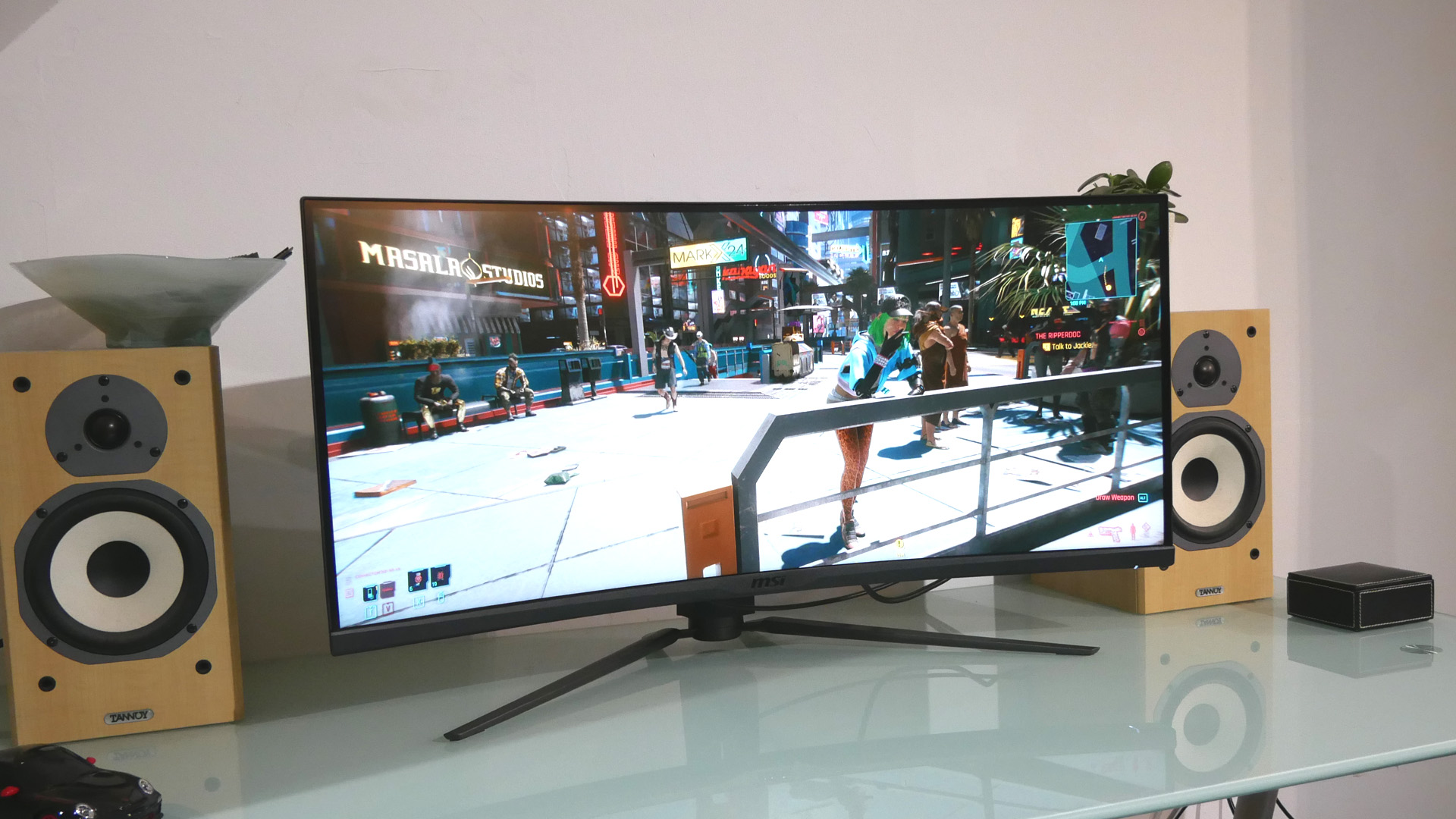GamesRadar+ Verdict
Super punchy, ultra-vibrant, and uber curved, MSI’s new gaming panel is an eye-popper.
Pros
- +
Ultra bright and punchy VA panel
- +
Extreme curve is incredibly immersive
- +
Excellent HDR performance for this type of screen
Cons
- -
Pixel response is merely decent
- -
Curvature not as convincing in Windows
- -
Not exactly cheap
Why you can trust GamesRadar+
Decided to do something? You may as well absolutely own it. This, surely, is the philosophy behind the new MSI MPG Artymis 343CQR. It’s an eye-popping screen by many metrics, not least thanks to its 34-inch superwide proportions, 165Hz refresh rate, 550cd/m2 brightness, and 1ms response. But it’s the 343CQR’s outrageously tight 1000R panel curvature that marks it out as something not just special but genuinely unusual - and a contender for best curved gaming monitor that we've in a while.
Arguably, it’s a brave move given curved screens are an acquired taste, in a way. Curved panels have almost disappeared from the HDTV market, for instance. However, they’ve retained a decent foothold in the PC market. As we’ll see, that’s for good reason.
Design & Features
First up, let’s mangle a metaphor and square away the specs of this uber-curved panel. It’s a 34-inch item with a 21:9 aspect ratio and 3,440 by 1,440 native resolution. So far, so par for the ultrawide course.
The unusual bit is the 1000R curvature. This thing is hilariously curved. More quantitatively, the arc of the panel is such that, when extended full circle, the radius of said circle would be just one metre. That is some very serious bend.
But it’s not quite the only unusual feature. Along with the curve, the MSI MPG Artymis 343CQR’s other stand-out specification is the use of a VA rather than an IPS panel. Granted, VA panels are not unheard of in the best gaming monitors. But the latest IPS LCD panel tech with its snappy response times and excellent viewing angles and colour accuracy have done a pretty comprehensive job of assimilating the market.
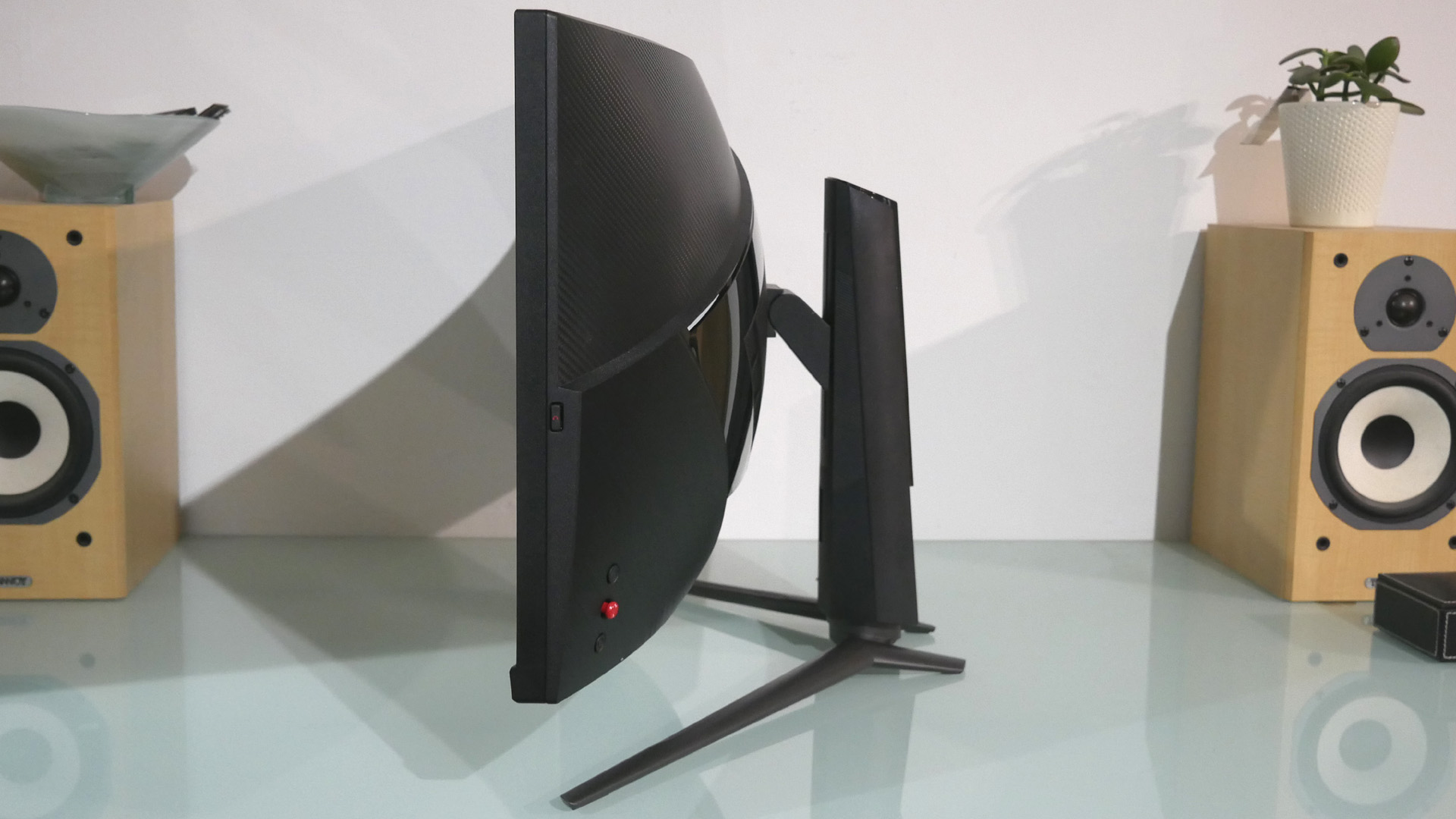
Despite that, MSI makes some bold claims for performance: response is rated at 1ms -albeit courtesy of the more forgiving MPRT measure rather than grey-to-grey - peak brightness is pegged at a punchy 550cd/m2, and contrast is quoted at 3,000:1. Rounding out the gamer-friendly feature set is 165Hz refresh, AMD FreeSync support, and VESA DisplayHDR 400 certification.
The latter is entry-level HDR certification, so expectations need to be kept in check, especially as the 343CQR lacks local dimming. However, this monitor comfortably surpasses the HDR 400 spec in terms of brightness. Combined with that excellent inherent panel contrast performance, it all bodes well for HDR capability that’s a cut above the norm. Indeed, were this an IPS panel, that high peak brightness combined with no local dimming would have us worrying about backlight bleed and excessive IPS glow. Maybe MSI is onto something with this VA panel stuff.
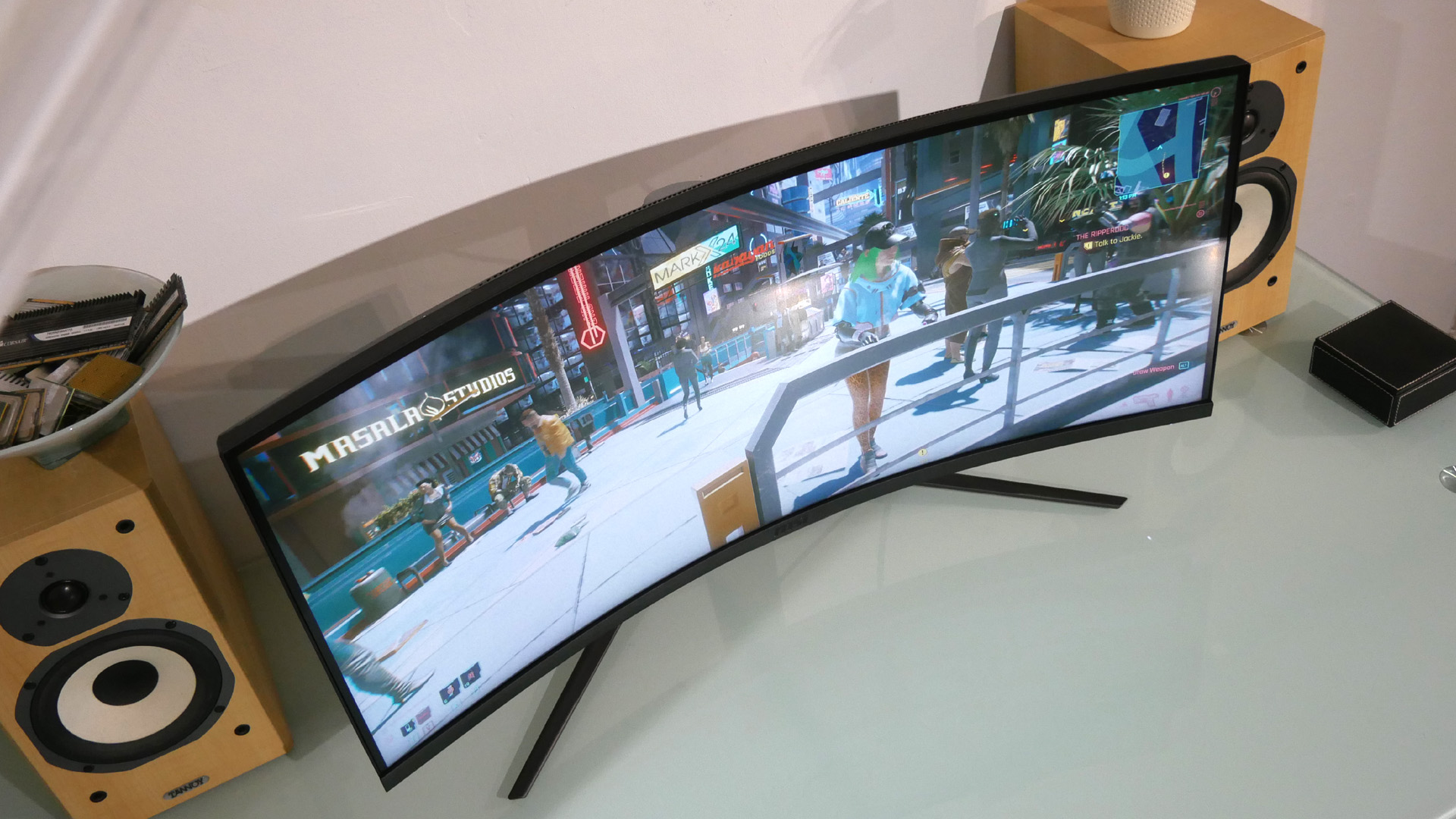
Performance
And so it very much proves. This monitor positively zings. It’s hugely punchy and vibrant. In fact, it delivers the best HDR performance we’ve yet seen from an HDR 400 panel. For a perfect demonstration of just what this screen is capable of, Cyberpunk 2077 with its luscious, high fidelity, ray-traced visuals is just the thing. In short, the combination of high contrast, strong brightness, and slick 165Hz refresh ensure that the 343CQR serves up one of if not the most immersive experiences we’ve seen in what is likewise one of the best-looking games ever, particularly when running on one of the best gaming laptops or best gaming PCs.
More generally, there’s definitely something about the extreme curvature and wrap-around vibe that hooks you into the game even more convincingly. It’s so effective, you’ll question the need for anything bigger than 34 inches, that’s for sure. The 3,440 by 1,440 native res is also a great compromise between maintaining high frame rates and delivering plenty of eye candy. The best 4K monitors for gaming are certainly snazzy when it comes to outright image detail. But you need one of the top performers from the internet's best graphics cards lists to achieve decent frame rates at that lofty resolution.
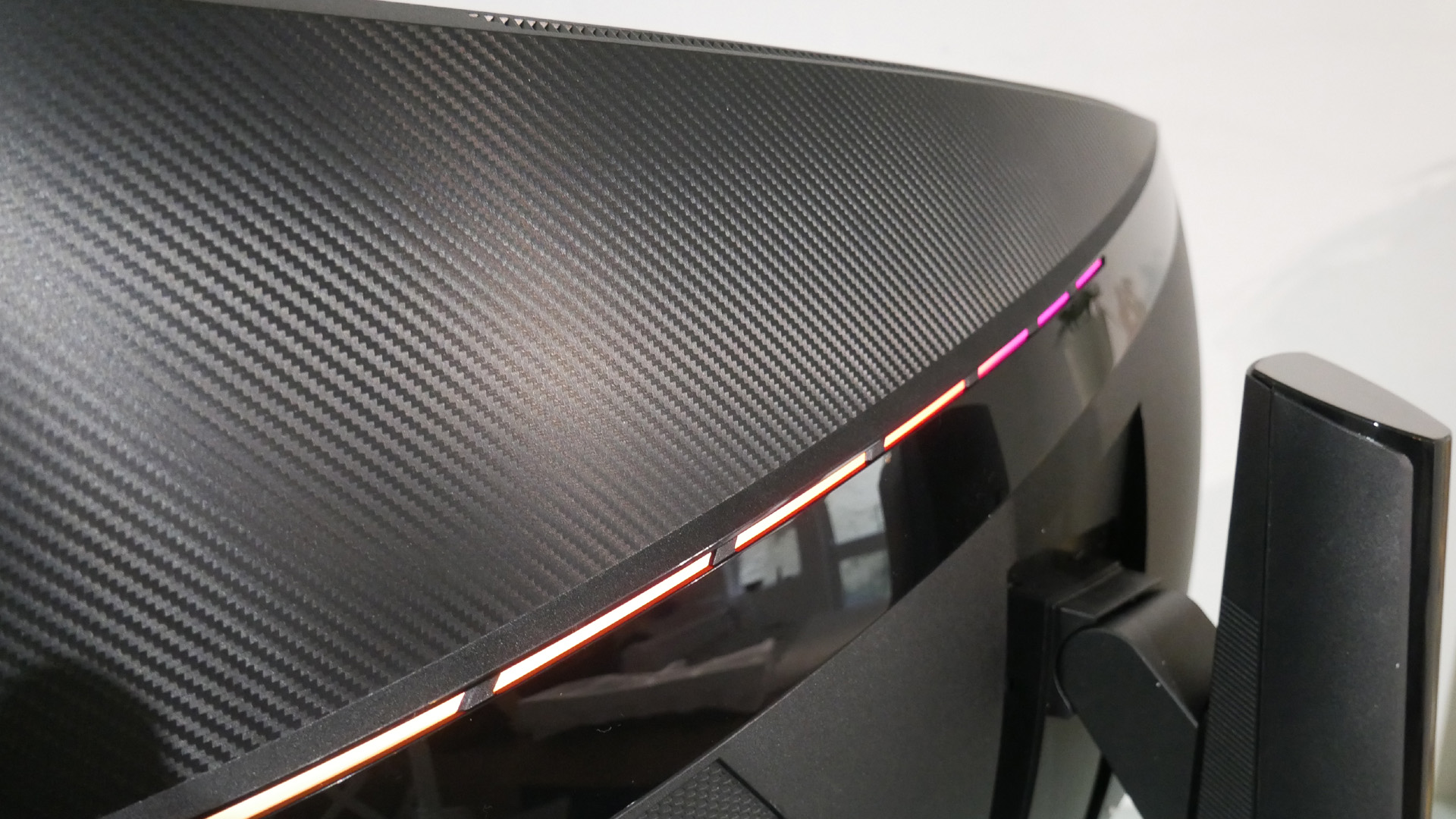
But what about the undoing of many a VA panel, namely pixel response? On first fire up, it’s not good news with plenty of blurring and smearing visible. Turns out, however, the 343CQR needs about 10 minutes to fully warm up, at which point it’s speedy enough to satisfy all but the most demanding esports addicts.
Yes, it’s not as quick as the best IPS panels, let alone an OLED screen. But in the context of LCD monitors, it’s decent for most types of gaming, the exception being hair-trigger online shooters. Oh, and for the record, while only AMD’s FreeSync adaptive refresh tech is officially supported, it is possible to get G-Sync working so it has a stab at being a top G-Sync compatible FreeSync monitor.
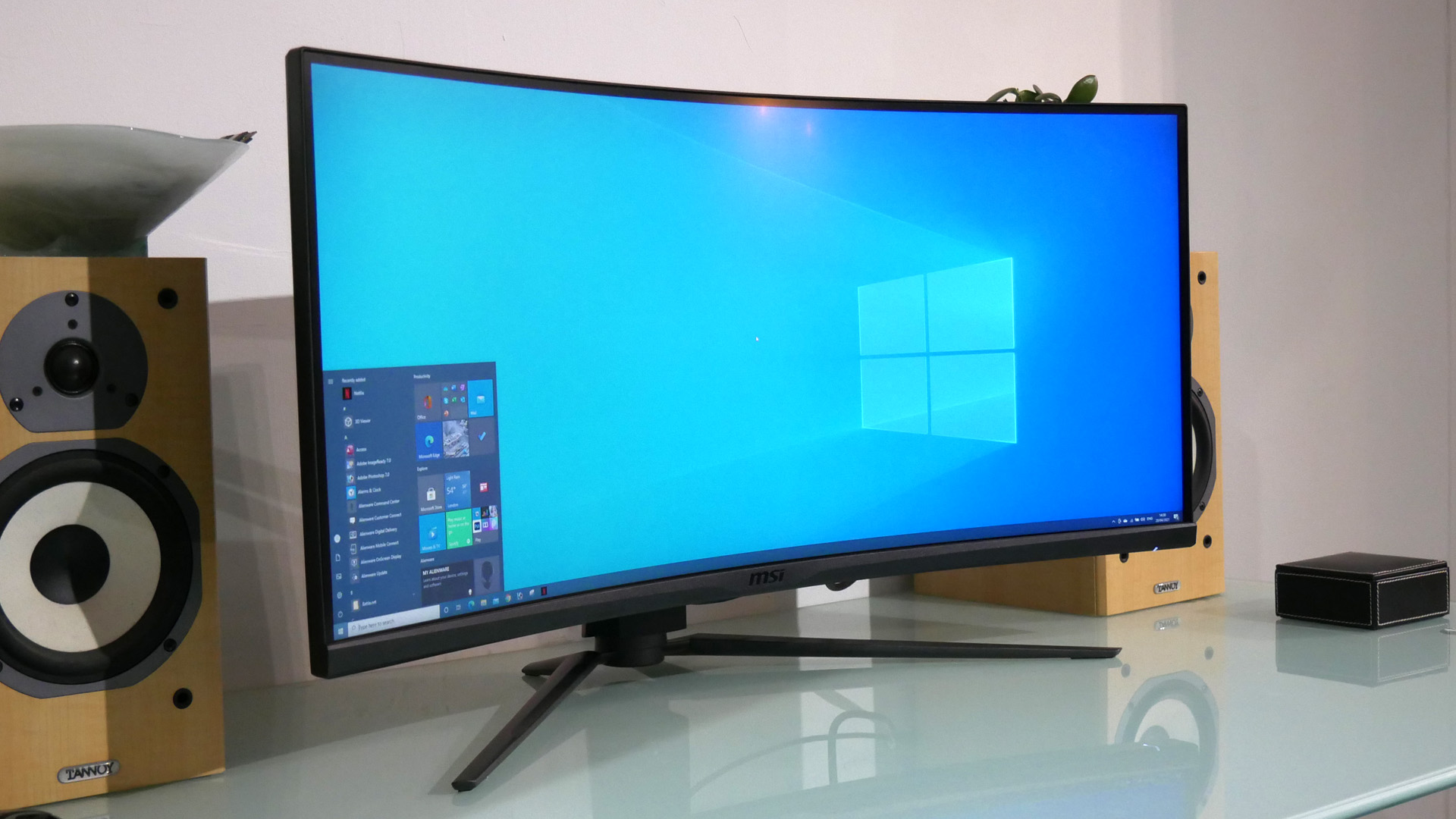
Overall - should you buy it?
For pure gaming thrills, that’ll be a definite yes. This monitor is an absolute delight to game on. It’s outrageously punchy and immersive in terms of image quality while offering slick frame rates and decent pixel response.
As an all-rounder with productivity, web browsing, and the rest thrown in, it’s a slightly more complicated proposition. The extreme curve is easy to love in-game, but more of an acquired taste on the Windows desktop. Similarly, the acute curvature and extreme aspect ratio don’t make for a great fit for console gaming, given neither the Xbox Series X nor the PS5 support 21:9 aspect ratios - so it's not a best PS5 monitor or best PS4 monitor contender, unfortunately.
However, as a pure PC gaming panel, the MSI MPG Artymis 343CQR is a genuine thrill. It’s just a shame it comes at such a premium price.
A serious dissertation on the finer points of input lag and overshoot followed by a forensic examination of AI-accelerated temporal upscaling. Such is a routine day in the working life of long-time tech wordsmith, Jeremy Laird. Along with GamesRadar, Jeremy’s 15-year back catalogue includes a host of tech and gaming outlets, including TechRadar and PC Gamer, not to mention contributions to mainstream media from the Independent to the Evening Standard. Complimenting Jeremy’s debilitating addiction to all kinds of digital hardware, he is also afflicted by an obsession with and a significant occupational sideline in cars and automotive technology.
